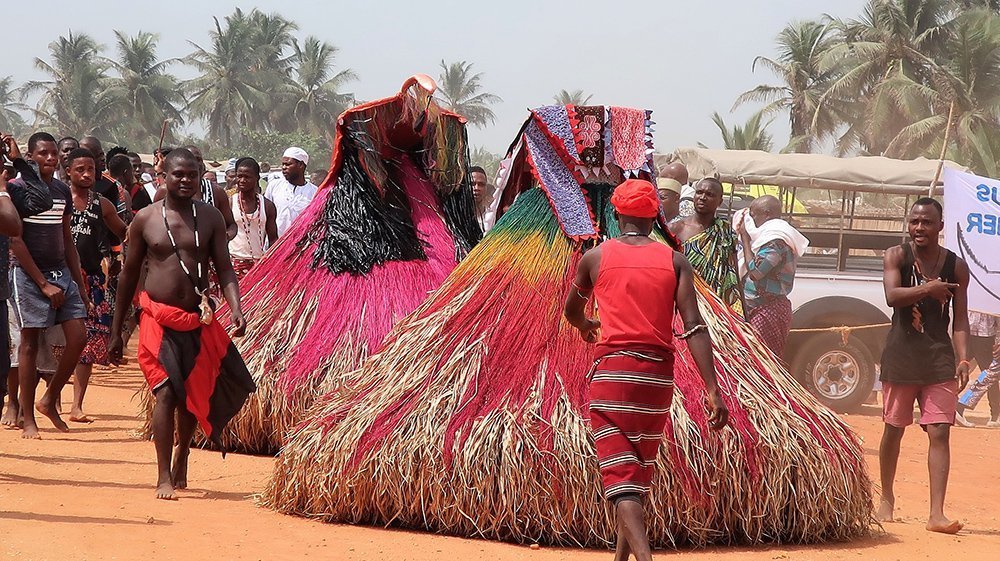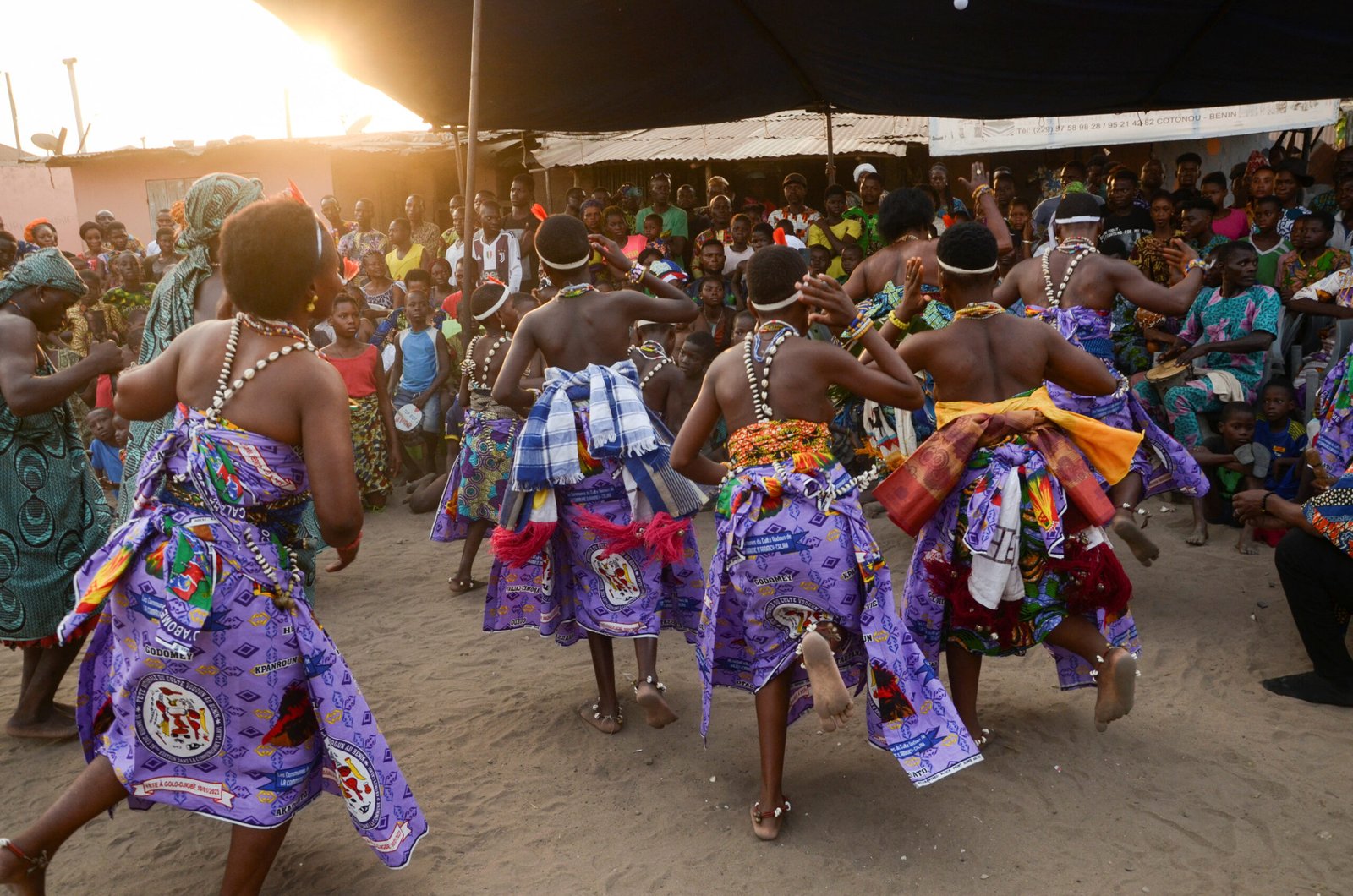Steeped in tradition and spirituality, Benin’s annual Vodun festival has undergone a transformation, now known as ‘Vodun Days.’
Kneeling as she gazes out to sea draped in white cloth and strings of pearls, Simenou Dangnitche has just completed the final stage of her annual ritual. Every January for the past 15 years, the 48-year-old local has joined hundreds taking part in Benin’s famed Voodoo festival.
Participants gather at the “Door of No Return,” an arch built by the beach at Ouidah in southern Benin in memory of those crammed onto slave ships bound for the New World. “It’s more than just a festival,” Dangnitche told AFP. “The meeting here is a pilgrimage, a rejuvenation, a reconnection with the ancestors to hear them speak to us again.”
Voodoo, known locally as Vodoun, is a religion that worships gods and natural spirits along with respect for revered ancestors. It originated in the Dahomey kingdom—present-day Benin and Togo—and is still widely practiced sometimes alongside Christianity in coastal towns like Ouidah, where memorials to the slave trade are dotted around the small beach settlement.
This year, Dangnitche said she was “stunned by the organization and structuring of the festival.” Benin’s government has rebranded the event and changed the format to make the festivities more appealing to tourists in a bid to boost the country’s economy. It opted for a two-day celebration on January 9-10 with a reorganized program in an event dubbed “Vodun Days.” According to politician Kakpo Mahougnon, chair of the Benin Vodun Rites Committee, the government is considering further extending the length of the festival.
“It’s a new way of presenting Vodoun,” said President Patrice Talon, who took part in the celebration. “Our intention is to fully reveal to the world what Vodoun is and how it is practiced, to explain Vodoun and its spiritual and sociological concepts,” the president said. “Vodoun is of economic interest to us, since tourism is an important sector,” he added.
Ouidah was given a makeover for the occasion, with several of the town’s attractions refurbished. American Christopher Swain, who said he comes every year to “recharge and reconnect spiritually,” noticed “significant changes.” Ouidah’s public squares hosted celebrations including jazz and dancing and even the president joined in.
The religion’s 73-year-old spiritual leader Daagbo Hounon told AFP: “We need to prove to the world that there is nothing Satanic or evil about Vodoun.” “Vodoun is about tolerance, sharing, love, generosity, and peace,” he said. “Vodoun is spiritual, but it is also several arts combined, as we can see from the songs and dances of the faithful.”

Alain Godonou, one of the heads of the Heritage and Tourism Agency, said the revamped celebrations “represent a major development in the promotion of Vodoun as a real catalyst for tourism.” They were “a way of attracting more curiosity so that people come to discover the essence of Vodoun,” he said. As well as international tourists, the government wants to focus on domestic tourism to boost the local economy and “reveal Benin to ourselves,” as Talon put it.
He declined to give details of the budget allocated to promoting and organizing Vodoun Days to attract visitors.
In a country where Vodoun is deeply ingrained in the cultural fabric, the festival provides an opportunity to showcase the rich heritage and traditions that define Benin. The rebranding and emphasis on tourism aim to debunk misconceptions surrounding Vodoun and present it as a positive force, focusing on its principles of tolerance, sharing, love, generosity, and peace.
The “Door of No Return” serves as a poignant reminder of the slave trade’s impact on the region, and the festival, now known as Vodun Days, offers a platform to explore and understand the spiritual and cultural aspects that have endured over the centuries.
President Patrice Talon’s active participation in the celebration signals the government’s commitment to promoting Vodoun and leveraging its economic potential through tourism. The renovation of Ouidah, the festival’s central location, further enhances its appeal to visitors.
With its roots in the Dahomey kingdom, Vodoun is not just a religion; it represents a way of life and a connection with ancestors. By rebranding and expanding the festival, Benin aims to share this unique cultural heritage with the world, fostering understanding and appreciation.
As Vodun Days unfold, the vibrant celebrations, traditional rituals, and cultural displays showcase the essence of Vodoun. By embracing this transformation, Benin is positioning itself as a cultural destination, inviting both international and domestic tourists to explore the richness of its traditions.
As the festival continues to evolve, it becomes a powerful tool for cultural diplomacy, breaking down stereotypes associated with Vodoun and fostering a sense of unity and pride among the Beninese people. The government’s strategic approach to highlight Vodoun’s positive aspects aligns with the broader goal of economic development through tourism.
In conclusion, Vodun Days in Benin marks a significant shift in the presentation of Vodoun, emphasizing its cultural and economic importance. The rebranded festival not only preserves age-old traditions but also opens doors for cultural exchange and tourism, contributing to the country’s growth and global recognition.
Travel to Europe
Coach rental in Europe
Travel agency Paris
DMC for Europe
DMC for Paris
